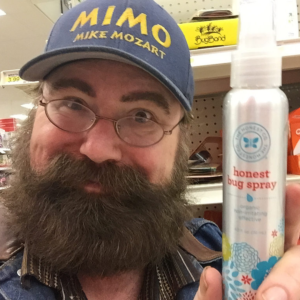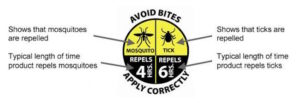Do You Know Which Mosquito Repellents Really Work? Most People Are Wrong
Being summer–and a wet one at that–it seems appropriate time to repost this favorite from Forbes:
Many Americans surveyed in June on how to protect themselves from mosquito-borne diseases like Zika, dengue and Chikungunya are ill-prepared. The June survey by Spectrum Brands Holdings showed that respondents were extremely overconfident about their knowledge. While almost a quarter of participants could not name even one effective active ingredient in insect repellents, 82% incorrectly believed that specific products were effective.

Knowledge of insect repellents
As explained in yesterday’s post about the survey results, many participants lacked even basic knowledge about what repellents are effective, although they were confident in their knowledge. Almost all were unfamiliar with some effective insect repellent ingredients, especially picaridin and IR3535, although most recognized DEET. More troubling is that “natural” ingredients, such as citronella, were believed to be effective by 73% of respondents, although they are not.
Why the confusion? The topic is not easy to understand and, more importantly, marketing seems very misleading. Here’s what you need to know.
What insect repellents are the most effective?
Mosquitoes are attracted to people by the scent of several chemicals we produce: lactic acid and 1-octen-3-ol, two skin compounds produced by our metabolism and sweating, and carbon dioxide, which we exhale. One interesting study from New Mexico State University published open access in the Journal of Insect Science found differences in results between Aedes albopictus and A. aegypti, the two species of mosquito that are most likely to carry these diseases, with albopictus less attracted to the test subject’s hand.
Let’s look at the best repellents. DEET has long been the “go-to” for a serious insect deterrent, and was first developed by the army to protect soldiers. DEET affects mosquitoes’ receptors, preventing them from detecting people, explained Kathy Cearnal, senior director of R&D for Cutter and Repel insect repellent lines. Its most common side effect is rash—and in high concentrations, will melt the plastic on cameras, binoculars and some synthetic clothing. Despite many people’s wariness, DEET has not been shown to be carcinogenic nor to cause birth defects, despite decades of use. Children are more sensitive, and lower concentrations and frequency of use are recommended, especially for the very young. There have been rare cases of seizures, mostly after drinking DEET. Drinking alcohol can also increase absorption. DEET should NOT be applied under clothing.
Picaridin is a chemical found in plants that produce black pepper. It also works by blocking our scent, but does not kill the insects, and is effective against mosquitoes, biting flies, ticks, fleas and chiggers. Picaridin’s main side effect is skin irritation; it is also toxic to fish.
IR3535 is active against mosquitoes, deer ticks, body lice and biting flies. It’s been used in Europe for more than 20 years with no serious adverse effects seen.
Oil of eucalyptus, or p-Menthane-3,8-diol, is a pesticide made from the lemon eucalyptus plant, targeting mosquitoes, biting flies and gnats. Cearnal says the mosquitoes are repelled by the smell. Eye irritation is the most common side effect.
Other repellents
Activity of some depends on frequency of application and on the type of prep.
For example, Avon Skin So Soft Bug Guard (10% Citronella) reduced attraction of Ae. albopictus up to 120 min after application, but Avon Skin So Soft bath oil (unknown ingredient) had no effect.
EcoSmart Organic Insect Repellent also worked against Ae. albopictus for 240 min, but rapidly lost effectiveness on Ae. aegypti.
A 0.5 ml application of pricey Victoria Secret Bombshell was effective for 2 hours in the small test.
A skin patch containing thiamine (vitamin B1) was ineffective.
Citronella candles are commonly used but are minimally better than plain candles, and Canadian volunteers “protected” by the citronella were still bitten more than once per minute.
Similarly, wristbands and ultrasound devices are ineffective.
Marketing
I blame much of the lack of understanding about insect repellents on marketing of the respective products. Cearnal stressed to me that the most effective repellents are DEET, picaridin and oil of lemon eucalyptus and concluded, “Choose an EPA-registered product and make sure you cover all exposed skin.” She added, “Naturals are there for people who don’t want to use chemicals.”
So I looked up what products are EPA-registered.
Cutter Natural contains geraniol and soybean oil and claims that it “includes a natural active ingredient, has been tested to ensure it is effective against mosquitoes.”
Neither ingredient is listed as active on the EPA’s site. Consumer Reports ranks all of the “natural” products as less than 30 on a 100-point scale and the New Mexico study concluded, “Cutter Natural Insect Repellent did not work in either species” of mosquito.
Similarly, citronella and all brands of other natural products tested are advised against by Consumer Reports, though there is slight, transient activity. The American Mosquito Organization says that Citronella candles are no better than any other plain candle, as does this 2011 study and this older study from the University of Guelph.
Yet these ineffective products are marketed heavily, because “natural” is fashionable and profitable.
One welcome change is the EPA’s repellency awareness graphic, though it is voluntary.

If a graphic is approved for a company, there is evidence of efficacy and studies that support the claims.
Best protection against mosquitoes
Most important in having a safe summer are environmental controls. Eliminate standing water in flowerpots, gutters, birdbaths, old tires, etc. One handy tip is to add sand to the bottom of self-watering flowerpots so there is no standing water.
Be sure that your home’s windows and doors are screened, if you can afford that. If in a high-risk area, consider using a bed net.

The most effective repellents contain DEET, picaridin or oil of eucalyptus (pmenthane3,8diol). DEET at 30% is quite effective. Lower concentrations of any product need to be applied more often. Interestingly, products with the same active ingredient sometimes had very different Consumer Reports rankings. They rated these highest: Picaridin 20% (Sawyer’s), DEET 30% (Ben’s) and oil of lemon eucalyptus 30% (Repel’s). Look for an EPA Registration Number (EPA Reg #) on the label.
Military studies gave Permethrin 0.5% spray a 97.7% efficacy rating and recommended using permethrin on clothing and DEET 20-35% on skin. Pregnant women can safely use DEET, picaridin, lemon eucalyptus and IR3535 on their skin per the EPA, if applied correctly.
To be safest, wear long pants, preferably sprayed with permethrin, and apply repellents regularly.
Conclusion
Many people have become frightened—sometimes more than necessary—about the use of any “chemical.” In contrast, they underestimate the risk of serious disease from mosquito and tick bites, and tend to view them as a summer rite of passage. We need intensive education on both. The EPA’s planned, simple graphic to help people understand proper use of a repellent is an excellent step, especially given the shockingly high illiteracy rates in our country.
Reliance on deceptive advertising promoting ineffective “natural” products for “consumer choice,” or on people’s ability to read and understand the risks and benefits of different products, is not a viable option. The stakes are too high. With Zika, in particular, we must do a better job educating about effective repellents.



